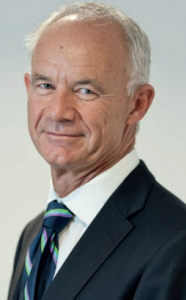Providing exceptional customer service is critical at Burhill Group Limited. With 10 centres to coordinate, chief executive Colin Mayes reveals what they do to keep people coming back…
 There will be more than 600,000 rounds of golf played over the course of a year at centres operated by Burhill Group Limited. One of the UK’s largest owners and operators of golf properties, the vision of the company is to offer “great destinations for every golf and leisure occasion”.
There will be more than 600,000 rounds of golf played over the course of a year at centres operated by Burhill Group Limited. One of the UK’s largest owners and operators of golf properties, the vision of the company is to offer “great destinations for every golf and leisure occasion”.
Alongside three traditional clubs, there are seven further golf centres aiming to provide accessible and affordable golf no matter the ability of the player.
With so much footfall on a weekly, monthly and annual basis, how they handle and deliver the service they give to their customers is vital to their growth and prosperity.
“We put a great emphasis on customer service,” said chief executive Colin Mayes. “We monitor it, both in the unit and through various surveys we encourage the managers to do.” For the last 18 months, they have been part of a system known as Net Promoter Score, which is also used by big businesses including the likes of Lexus.
Mayes explained: “Every day we invite feedback from a portion of our customers to rate us, based on a score of 0 to 10 – with 10 being outstanding and they’d recommend us to a friend and 0 meaning they won’t come back. We monitor those on a daily basis.
 “All of those results come to me, they come to the general managers and they come to the reservations team.
“All of those results come to me, they come to the general managers and they come to the reservations team.
“Each of the general managers are tasked with following those up within 48 hours – and particularly any poor ones – to find out exactly what went wrong and see if we can put it right.”
Mayes receives three emails daily, one with positive responses, one with negative and a further email detailing which customers are yet to be contacted and how long it has been since their initial response.
It is all very hands on but, coming from a hotel background, he says clubs need to take that kind of approach if they are to compete successfully in the busy leisure industry market.
“I very much view golf as hospitality,” he said. “People are spending their leisure time with us and they are not only there for a game of golf, they are there for the camaraderie of playing with friends and for a day of enjoyment.
“Golf has got to get in the real world. If we are not delivering entertainment, if we are not delivering great food and beverage, if we are not delivering great service, then people will choose to go elsewhere. It’s as simple as that.
“It’s expected in a golf club now and, if you don’t monitor it, you are going to lose business. If you are not on top of it, you will lose business.”
Mayes isn’t afraid of hearing criticism, either – arguing that it is from some of the various centre’s ‘detractors’ that the greatest overall improvements can be made.
He has also had to curb the natural cynicism of his general managers and employees, some of whom initially thought the Net Promoter Score was a vehicle to criticise their performance.
Now, with managers taking action to respond to customers and therefore getting closer to them, Mayes argues that it is actually assisting them to deliver better customer service.
“You always learn more from what we call our detractors than those that praise us,” he said.
“Invariably, if they are thinking something then somebody else has thought it. It has been a bit of a cultural shift – I have to tell you.
“We are 18 months into our NPS survey and we have significantly moved up our score over that period.
“We have climbed about 10 percentage points and we are aiming to do a lot better in the next year.”
From an office point of view, Mayes added that the continuous desire to drive up standards has had another impact.
“It does create a good bit of positive competitive tension between each of the managers because they all pride themselves on the fact that they are offering a high quality of service.
“The fact that their colleagues down the road or another unit are doing better than them – they want to know why and they want to know why they can’t do better.
“They pass that down to the heads of department and it is a learning process. It’s just a way of life that’s one has got to get used to.
“Some view it as constantly criticising. “Well, frankly, that’s the real world because expectations have just got a lot higher.”
The group employ more than 700 staff across their 10 centres and Net Promoter Score has become a huge part of the business – with results discussed at heads of department meetings and downwards.
With such a varied golf offering, keeping the standards high and consistent can be a challenge, admitted Mayes. But he reckoned allowing someone to suffer a negative experience and walk away without that being remedied could be hugely damaging. “I always count that a good experience, they tell three people. A bad experience, they tell at least 12. You haven’t lost just one customer. You’ve probably lost 13.”
So what, in Mayes’ opinion, makes great customer service?
“The most important thing is the ability to engage. So often people now are numbers. “They are an account number. They do things from the internet. “It’s getting teams and staff to engage and actually talk to and find out what customers want – whether they have enjoyed their game at the golf club.
“It’s as simple as a welcome when they arrive, making sure they know where the changing rooms are, making sure they know what their start time is, finding out whether they are playing with friends, have they got the equipment that they need?
“It really is about the welcome and it’s about making sure when they leave that somebody has at least checked that they have had a good time and, if they haven’t, then we try to do something about it in one way or another. “That might be by perhaps offering them a complimentary round when they come back, if it hasn’t been all right – and thankfully that doesn’t happen very often.
“I would sum it up as the ability to engage – engage and talk to the customer.
“That’s not an easy task, because British staff are generally quite reserved. Thankfully, we’ve got some great ones who do talk to customers. “There’s nothing like talking to a customer.
“If you go into a restaurant and you find a waiter that will engage with you, find out why you are there – whether it’s a birthday party or just having a quiet night with your wife – you have instantly got a relationship.
“It is all about building a relationship.
What is Net Promoter Score?
Net Promoter Score is a management tool that helps firms guide the loyalty of their customer relationships. More than two thirds of Fortune 1000 companies use the metric. Based on responses to a question on customer satisfaction, scoring is usually based on a scale of 0 to 10. People who respond with very high scores are known as Promoters, while those who deliver scores of six or fewer are labelled Detractors. Participants are usually encouraged to elaborate on the reasons for their scores. Those reasons can then be delivered to management teams and staff to be followed up and acted upon.


